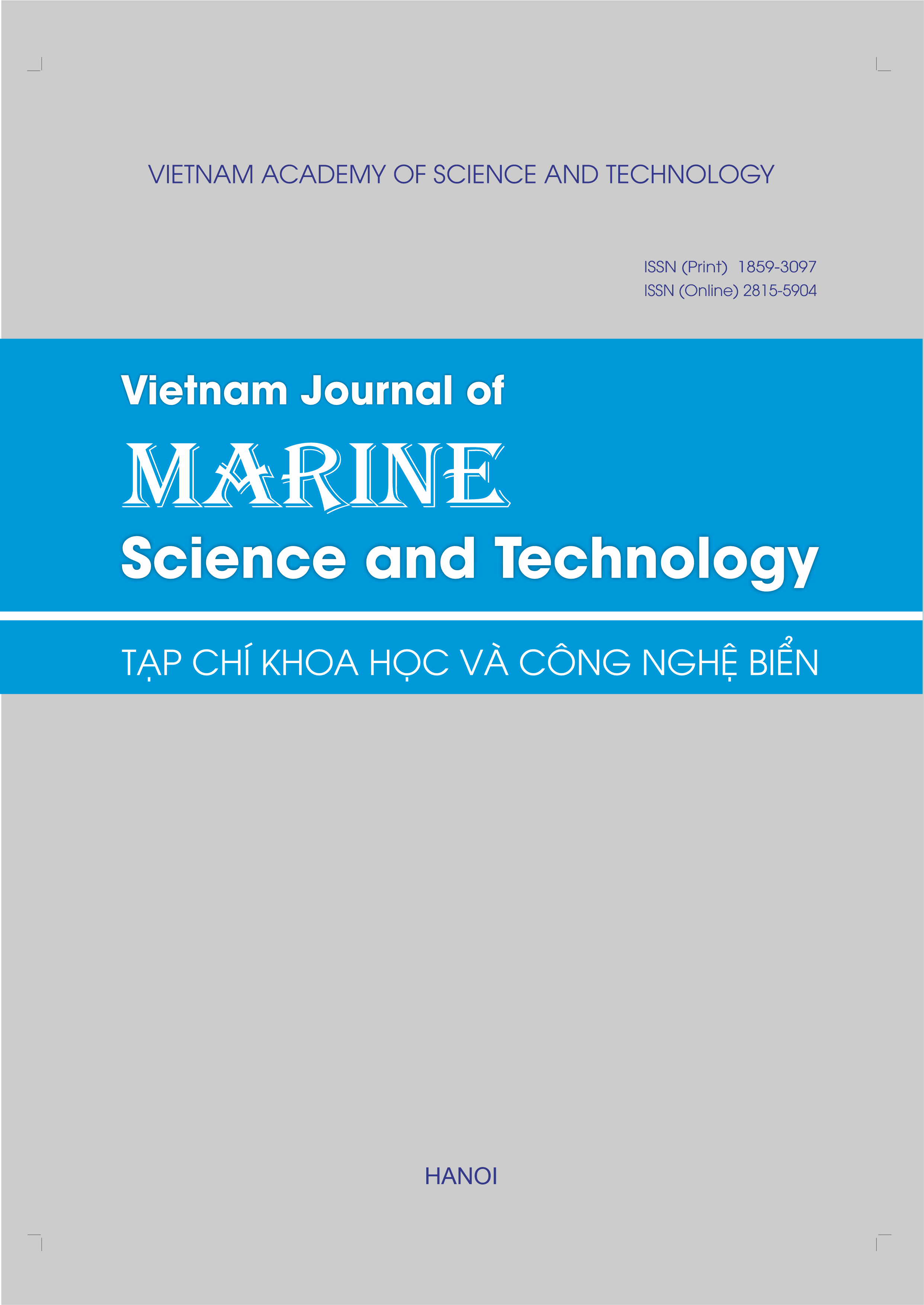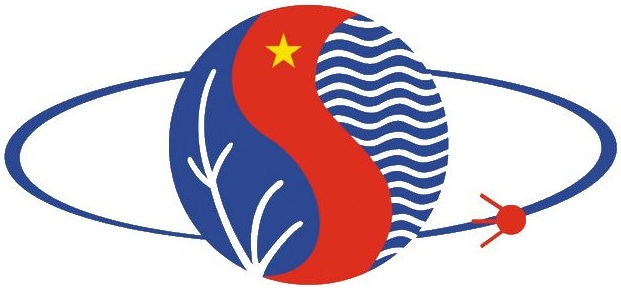NEW DATA ON WATER ENVIRONMENT AND ORGANISM IN SUBMERGED CAVES AND SALTWATER LAKES IN HA LONG AND CAT BA AREAS
Author affiliations
DOI:
https://doi.org/10.15625/1859-3097/16/2/7341Keywords:
Submerged caves, saltwater lakes, biodiversity, environment.Abstract
Submerged caves and saltwater lakes are 2 common habitat types in Ha Long and Cat Ba. However, depending on many different reasons so far they have been poorly studied both on environmental and biological characteristics. The initial results on environment and biological communities in 3 submerged caves (Hang Sang, Hang Toi, Qua Bang) and 3 saltwater lakes (Ang Dau Be, Ang Du, Ang Qua Bang) showed that: status of water environment was different among lakes, especially in the closed lake as Ang Du where salinity was low (9‰), while salinity in the lakes connected to the sea was equal to marine environment (23 - 27‰). Concentration of dissolved oxygen (DO) in saltwater lakes was high from 7.63 - 9.03 mg/L and higher than that in submerged caves and surrounding marine environment. Physical and chemical factors of water in the submerged caves were equivalent to the marine environment because these caves are connected to the sea and water regularly goes in and out according to tidal fluctuation. Organism communities in the submerged caves were abundant with over 142 species being found. The popular groups, sponge and soft coral, were distributed along the length of the caves. Several species with high economic value were commonly observed in the caves, including stone crab Myomenippe hardwickii, flower crab Portunus pelagicus, cone snails Trochus pyramis, shoemaker spinefoot Siganus sutor, snapper Lutjanus russelii ... Species that permanently live in cave were not detected. In the lakes where water is well exchanged to the sea, coral reefs were found and they formed a narrow reef around the lake. Sandy bars often appeared around the lake at the depth of 0.5 - 2 m, containing specialty species as phi (Sanguinolaria diphos), snout otter clam (Lutraria rhynchaena), sea cucumbers with high density (Ang Dau Be, Ang Qua Bang). There was no coral reef in the closed lake (Ang Du) because of low salinity. In this lake, stratification of temperature and salinity led to temperature on surface lower than that on bottom from 30C to 60C, this phenomenon is unusual.Downloads
References
Trần Đức Thạnh, 2012. Kỳ quan địa chất vịnh Hạ Long. Tạp chí Các khoa học về Trái đất, 34(2): 162-167.
Cerrano, C., Azzini, F., Bavestrello, G., Calcinai, B., Pansini, M., Sarti, M., and Thung, D., 2006. Marine lakes of karst islands in Ha Long Bay (Vietnam). Chemistry and Ecology, 22(6): 489-500.
Azzini, F., Calcinai, B., Cerrano, C., Bavestrello, G., and Pansini, M., 2007. Sponges of the marine karst lakes and of the coast of the islands of Ha Long bay (North Vietnam). Custodia MR, Lobo-Hajdu G, Hajdu E, Muricy G, Porifera research: Biodiversity innovation and sustainability. Rio de Janeiro, 157-164.
Gurjanova, E. F., and Phuong, C. H., 1972. Intertidal zone of the Tonkin Gulf. Journal of Exploration of the fauna of the sea, 10, 179-209.
English, S., Wilkinson, C., and Baker, V., 1997. Manual for survey of tropical marine resources 2nd Edittion. 390 p.
Abbott, R. T., 1991. Seashells of Southeast Asia. Graham Brash. 145 p.
Abbott, R. T., and Dance, S. P., 1986. Compendium of Seashells. Melbourne, Florida: American Malacologists.
Böggemann, M., and Eibye-Jacobsen, D., 2002. The Glyceridae and Goniadidae (Annelida: Polychaeta) of the BIOSHELF Project, Andaman Sea, Thailand. Phuket Marine Biological Center, Special Publication, 24, 149-196.
Cernohorsky, W. O., 1972. Marine shells of the Pacific (Vol. 2). Pacific publications. 411 p.
Dance, S. P., 1997. Das grobe Bush der meer musheln: Schnecken und. Muscheln d. Weltmeer. Verlag Eugen Ulmer Stuttgart. 304 p.
Day, J. H., 1967. A Monograph on the Polycheata of Southern Africa. Part I: Errantia. 458 p
Day, J. H., 1967. A Monograph on the Polycheata of Southern Africa. Part II: Sedentantaria. 419 p
Fauchald, K., 1977. The polychaete worms; definitions and keys to the orders, families and genera. 188 p.
Fauvel, P., 1953. The Fauna of India including Pakistan, Ceylon, Burma and Malaya. Annelida Polychaeta. Allahabad, The Indian Press, 507 p.
Fitzhugh, K., 2002. Fan worm polychaetes (Sabellidae: Sabellinae) collected during the Thai-Danish BIOSHELF project. Phuket Marine Biological Center Special Publication, 24, 353-424.
Holthuis, L. B., Fransen, C. H., and Van Achterberg, C., 1993. The recent genera of the caridean and stenopodidean shrimps (Crustacea, Decapoda) with an appendix on the order Amphionidacea.
Imajima, M., 1972. Review of the annelid worms of the family Nereidae of Japan, with descriptions of five new species or subspecies. Publisher not Identified,
, 37-153.
Morris, P. A., 1972. A Field Guide to shell of the Atlantic and Gulf Coasts and the West Indies. The Peterson Field Guide serise. Houghton Mifflin Company Voston. 330 p.
Snedaker, S. C., and Snedaker, J. G., 1984. The mangrove ecosystem: research methods. Unesco. p. 143-161.
Sakai, T., 1976. Crabs of Japan and the Adjacent Seas. Tokyo, Kodansha Ltd., pp xxix, pls.251.
Turner, R. D., and Boss, K. J., 1962. The genus Lithophaga in the western Atlantic. Department of Mollusks, Museum of Comparative Zoölogy, Harvard University.
Cernohorsky, W. O., 1972. Marine shells of the Pacific (Vol. 2). Pacific publications. 411 p.
Gallardo, V. A., 1968. Polychaeta from the Bay of Nha Trang, South Viet Nam. Scripps Institution of Oceanography.
Veron, J. J., and Pichon, M. M., 1976. Scleractinia of eastern Australia. Part I: Families Thamnasteriidae, Astrocoeniidae, Pocilloporidae. 1, 1-86.
Veron, J. E. N., and Pichon, M. Wijsman-Best, M., 1977. Scleractinia of eastern Australia. Part II. Families Faviidae, Trachyphyliidea. Australian Institute of Marine Science Monograph Series, 3, 1-233.
Veron, J. J., and Pichon, M. M., 1980. Scleractinia of Eastern Australia. Part III: Families Agariciidae, Siderastreidae, Fungiidae, Oculinidae, Merulinudae, Mussidae, Pectiniidae, Caryophylliidae, Dendrophylliidae. 4, 1-422.
Veron, J. J., and Pichon, M. M., 1982. Scleractinia of eastern Australia. Part IV: Family Poritidae. 5, 1-159.
Veron, J. E. N., and Wallace, C. C., 1984. Scleractinia of Eastern Australia. Part V - Families Acroporidae. Australia Institute Marine Science Monogr. Ser. 6, 1-485
Veron, J. E. N., 1986. Corals of Australia and the Indo-Pacific (p. 490). Angus & Robertson.
Veron, J. E. N., 2000. Corals of the World. Vol. 1-3. Australian Institute of Marine Science, Townsville.
Nguyễn Hữu Dinh, Huỳnh Quang Năng, Trần Ngọc Bút, Nguyễn Văn Tiến, 1993. Rong biển Việt Nam (phần phía Bắc). Nxb. Khoa học và Kỹ thuật, Hà Nội. 364 tr.
Phạm Hoàng Hộ, 1969. Rong biển Việt Nam (phần phía Nam). Trung tâm học liệu Sài Gòn. 558 tr.
Bowerbank, J. S., 1869, January. A Monograph of the Siliceo‐fibrous Sponges. In Proceedings of the Zoological Society of London (Vol. 37, No. 1, pp. 66-100). Blackwell Publishing Ltd.
Bowerbank, J. S., 1869, January. A Monograph of the Siliceo‐fibrous Sponges. In Proceedings of the Zoological Society of London (Vol. 37, No. 1, pp. 323-351). Blackwell Publishing Ltd.
Beaufort, L. F., 1994. The Fishs of the Indo-Australian. Vol 8. pp. 16-323.
Beaufort, L. F., 1994. The Fishs of the Indo-Australian. Vol 9. pp. 1-393.
Eschmeyer, W. N., 1998. Catalog of fishes.
Carcasson, R. H., 1977. A field guide to the coral reef fishes of the Indian and West Pacific Ocean.








